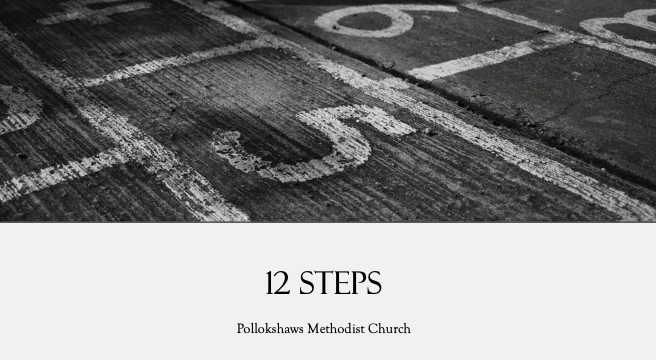
In our six-week look at the 12 Steps programme used by those in the Anonymous groups, we have covered the first step “We admit we are powerless over life challenges and that our lives can become unmanageable“. We saw that there was a difference between being powerless and being helpless.
This week we look at the next 2 steps:

Step 2: We have come to believe that a Power greater than ourselves could restore us to sanity; and
Step 3: We have made a decision to turn our will and our lives to the care of God, as we understood him.
There are some key words here: Power, sanity, and God.
Power
That word Power is capitalised; it means more than just the capacity to do work. It’s akin to being alive, it has a life of its own. What might you think Power might mean? In recent weeks, the programme of Bible readings for the church has suggested that we read from Mark Chapter 1, where it speaks of demons. Some would immediately refer to that as red skinned monsters, albeit that is from 4th C art work. Some would suggest that a demon is anything that has power over us, but is not of God. Which is a problem, as it presupposes God. Demons can’t exist in this form without God.
Sanity
The next word is sanity. There are medical definitions for sanity, but how might you define it?
The Collins dictionary defines it as “A person’s sanity is their ability to think and behave normally and reasonably.” So, now we are in a debate what is normal and reasonable.
https://www.collinsdictionary.com/dictionary/english/sanity
Oddly, in a legal sense, sanity is defined in terms of the opposite : “A defendant is presumed by law to be sane and accountable for his actions unless the contrary is proved. It is for a defendant to establish the defence of insanity on a balance of probabilities and the inaptly named Trial of Lunatics Act 1883 provides for the special verdict of not guilty by reason of insanity.“
https://www.exchangechambers.co.uk/ian-harris-mnaghten-rules/#:~:text=A%20defendant%20is%20presumed%20by,guilty%20by%20reason%20of%20insanity.
I am suggesting that for an alcoholic, for example, insanity is where the demon of drink has taken over their capability to live. To live is to drink, for it allows some form of protection. I have been told often that a 2 litre bottle of White lightning cider gives people a few hours away from the burden of life. We might see them as comatose.
Conversely sanity is being sober.
For all of us, that loss of sanity, however that may be defined, could be through a loss of being able to be considered mentally capable. Grief can cause us to be affected where our thought patterns can be disturbed.
God, as we understood him
We might imagine God as a man, with a white beard, sitting aloft on a cloud, and with his hand pointing down, firing off thunderbolts, or trying to just touch another hand with their fingertips. When the Bible is full of male and female descriptions of God, our grammar, our culture seemingly defines God as generally male. Those in Central America may not agree. Their suffering from men created an alternative image, that of Christa, a feminine form on the cross. It meant so much to them. For some people, God as a man can be distinctly troublesome as the men in their life have been exactly that: not loving – in fact far from loving, abusive.
For some people, they can see God within nature, in the people they meet. If Jesus was God in human form, this was one way of God being seen. The Israelites saw God in many forms: in Genesis, they speak of Elohim, which is of God in both the masculine and the feminine. How might we feel if we hear of God in a form as one we might agree with?
Isaiah 54
“Enlarge the place of your tent, stretch your tent curtains wide, do not hold back; lengthen your cords, strengthen your stakes. For you will spread out to the right and to the left; your descendants will dispossess nations and settle in their desolate cities. “Do not be afraid; you will not be put to shame. Do not fear disgrace; you will not be humiliated. You will forget the shame of your youth and remember no more the reproach of your widowhood. For your Maker is your husband— the Lord Almighty is his name – the Holy One of Israel is your Redeemer; he is called the God of all the earth.” (vv2-5)
If we come to believe in a Power – however you describe that – that could restore us to sanity, we are enlarging our world. With depression, it becomes noticeably smaller. The ‘black dog’ analogy is apt, as depression, a power that affects our ability to rationally think and operate, limits our perceived world. We may want to shrink away, go back to our bed, our worse. However, if we can enlarge our world, throw the bed covers away, we may start to inhabit the world where we are.
There is talk here of shame. If guilt is that response to what we have done, shame is what we feel – there is a difference. Shame is something that we can hold onto, like a comfort blanket, to something which we need not grip. We can feel shameful about something that we have already been forgiven, but we can also be released from that. We come each week to church and seek forgiveness for what we have done those past days. Whereas, God, through the cross, has already forgiven us: any feeling of shame need not be carried.
Questions:
Are we able to see the breadth of God, in all that we see and experience?
What might we fear, especially of the unknown which might impact from our faith?
Is this about surrender? If we surrender to God, this Power, then all will be well. I struggle with surrender as we have a God who loves us. Do we normally use surrender in this circumstance?
Conclusion
Can we believe that God restores our sanity? What if Christians suffer from mental health concerns, depression, even thoughts of suicide? Are they in direct conflict that their sanity is affected but still connected to God?
Or does being in that relationship with God mean more in the longer journey, now and beyond, than the time we are here on Earth? If so, does this mean that God permits suffering? Ouch, harsh…

I found it interesting and I enjoyed it
At my Mum’s Thanksgiving service we used the following blessing at the end from Julian of Norwich:
In you Father Almighty, we have our preservation and our bliss;
In you Christ, we have our restoring and our saving
You are our mother, brother and our Saviour.
In you, our Lord the Holy Spirit is marvelous and plenteous Grace.
You are our clothing; for love you wrap us and embrace us.
You are our Maker, our lover and our keeper.
Teach us to believe, that by your Grace
All shall be well; All shall be well; And all manner of things shall be well.
Amen.
After the service, one of my cousins, who helped set up their own House Church many years ago in the 1970s spoke of his unease about calling Christ “female”. After my initial surprise, I thought about it and realised perhaps the idea could be threatening, although Julian of Norwich wrote this blessing many years before the current debates and controversy about Transgender identities.
I tried to reassure my cousin and instead talked of how I thought of the Trinity being male and female and in particular the Holy Spirit being female to which I think he agreed. I am glad that your post also confirms these ideas and found myself following the link Elohim and finding that very interesting.